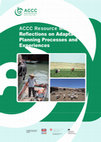Papers by Sarah Opitz-Stapleton
ODI and UNDP, 2019
Over the past decade, there has been important progress on poverty reduction, disease control and... more Over the past decade, there has been important progress on poverty reduction, disease control and access to healthcare, education and services, including in some of the world’s poorest countries. However, these gains are fragile, and are undermined by threats, shocks and hazards. The damage triggered by shocks, stressors, natural hazards and threat events such as terrorism are not just due to the severity or nature of the event: they are also determined by social, political, economic and environmental development decisions, within countries and globally. Development choices and trajectories can, and often do, increase inequality, poverty and environmental degradation, and vulnerability and exposure to harm when threats occur.

Climatic Change, 2013
ABSTRACT This paper provides an overview of climate change impacts on tribal water resources and ... more ABSTRACT This paper provides an overview of climate change impacts on tribal water resources and the subsequent cascading effects on the livelihoods and cultures of American Indians and Alaska Natives living on tribal lands in the U.S. A hazards and vulnerability framework for understanding these impacts is first presented followed by context on the framework components, including climate, hydrologic, and ecosystem changes (i.e. hazards) and tribe-specific vulnerability factors (socioeconomic, political, infrastructural, environmental, spiritual and cultural), which when combined with hazards lead to impacts. Next regional summaries of impacts around the U.S. are discussed. Although each tribal community experiences unique sets of impacts because of their individual history, culture, and geographic setting, many of the observed impacts are common among different groups and can be categorized as impacts on—1) water supply and management (including water sources and infrastructure), 2) aquatic species important for culture and subsistence, 3) ranching and agriculture particularly from climate extremes (e.g., droughts, floods), 4) tribal sovereignty and rights associated with water resources, fishing, hunting, and gathering, and 5) soil quality (e.g., from coastal and riverine erosion prompting tribal relocation or from drought-related land degradation). The paper finishes by highlighting potentially relevant research questions based on the five impact categories.
Occupational extreme heat exposure can lead to a number of heat-health impacts for workers. We in... more Occupational extreme heat exposure can lead to a number of heat-health impacts for workers. We investigated potential changes in day and nighttime ambient temperatures and heat indices for Da Nang, Vietnam over the period 2020-2049 when compared with 1970-1999, and potential implications for workers.
Bulletin of the American Meteorological Society, 2012
Julie brugger "We have to ask ourselves, are we doing the right thing? Or are we using scientific... more Julie brugger "We have to ask ourselves, are we doing the right thing? Or are we using scientific information to do the wrong thing more precisely?"

This manual presents the processes, methodologies, lessons and experiences from the Adapting to C... more This manual presents the processes, methodologies, lessons and experiences from the Adapting to Climate Change in China (ACCC) Programme. It was prepared in different stages and evolved along with the needs, priorities and experiences of the ACCC research teams... The challenges experienced in ACCC around research, policy, and action are actually quite common in adaptation planning processes and programmes around the world. While climate change is a global phenomenon, the activities that contribute to climate change and its impacts are inherently local. However, the suites of solutions required to both mitigate and adapt to it reflect actions at the local-level, informed and supported by provincial and national policy and programmes. As a result, there is no single adaptation planning process that is the only correct process; no step-by-step recipe books exist for how to conduct such processes or prescribed methods and steps. There should NOT be a single, prescriptive process, howev...
This paper provides an overview of climate change impacts on tribal water resources and the subse... more This paper provides an overview of climate change impacts on tribal water resources and the subsequent cascading effects on the livelihoods and cultures of American Indians and Alaska Natives living on tribal lands in the U.S.











Uploads
Papers by Sarah Opitz-Stapleton